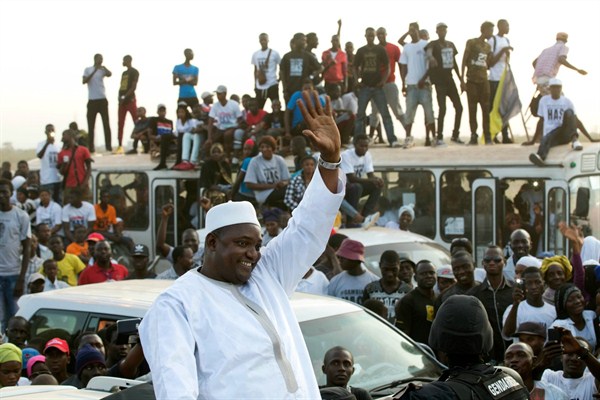In December 2016, the people of Gambia elected an opposition presidential candidate for the first time in the country’s history. The outcome caught virtually everyone by surprise, including the incumbent, Yahya Jammeh, who had brutally ruled the small West African nation as a veritable mafia state for more than two decades. Despite initially conceding defeat on national television, Jammeh reversed his position a few days later, declaring the election null and void after claiming he had personally discovered “voting irregularities” in the final results.
Jammeh’s attempt to defy the will of the Gambian people sparked a two-month-long crisis, provoking an impressive African-led mediation effort that included the threat of military intervention to ensure the installation of President-elect Adama Barrow, a coalition candidate whose rise to power was both swift and unprecedented. Amid massive international media attention, and as Senegal’s military amassed its forces just outside the capital, Banjul, the defeated Jammeh ultimately decided to leave—without a shot fired or a single life lost. Today, Jammeh lives in exile in Equatorial Guinea, reportedly residing in a palace fit for a kleptocrat, much like his new host, Teodoro Obiang Nguema Mbasogo, Equatorial Guinea’s president and Africa’s longest-ruling leader.
Listen to Jeffrey Smith and David Rice discuss this piece on WPR's Trend Lines Podcast:
Despite living a life of privilege in exile, however, it will not be easy for Jammeh to escape the specter of his repressive and brazenly violent past. Indeed, after decades of state-initiated human rights abuses—including torture, mass executions, extrajudicial killings and forced disappearances—the former dictator has left behind a legacy of widespread and deeply entrenched mistrust among Gambians of their nation’s institutions. During his years in power, Jammeh both created and exacerbated social fault lines, primarily by pitting different ethnic groups against one another. No one in the country was left unscathed by his regime’s wanton brutality.

